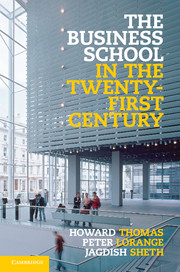Book contents
- Frontmatter
- Contents
- List of figures
- List of tables
- Preface: Tipping or tripping? The business school and its dilemmas
- Acknowledgements
- 1 The business school: history, evolution and the search for legitimacy
- 2 Business school identity and legitimacy: its relationship to the modern university and society
- 3 Rethinking management education and its models: a critical examination of management and management education
- 4 A framework for re-evaluating paradigms of management education
- 5 Evaluating new and innovative models of management education
- 6 Is the business school a professional service firm? Lessons learned
- 7 Enhancing dynamic capabilities in the business school: improving leadership capabilities in curricula and management
- 8 Afterword: business school futures
- Index
- References
3 - Rethinking management education and its models: a critical examination of management and management education
Published online by Cambridge University Press: 05 July 2013
- Frontmatter
- Contents
- List of figures
- List of tables
- Preface: Tipping or tripping? The business school and its dilemmas
- Acknowledgements
- 1 The business school: history, evolution and the search for legitimacy
- 2 Business school identity and legitimacy: its relationship to the modern university and society
- 3 Rethinking management education and its models: a critical examination of management and management education
- 4 A framework for re-evaluating paradigms of management education
- 5 Evaluating new and innovative models of management education
- 6 Is the business school a professional service firm? Lessons learned
- 7 Enhancing dynamic capabilities in the business school: improving leadership capabilities in curricula and management
- 8 Afterword: business school futures
- Index
- References
Summary
The previous chapter outlined the continuing tensions between business schools and universities regarding legitimacy, identity and relevance of research and curricula. It pointed out the consequent need to reframe and re-examine business and management education through the lenses of new paradigms and models.
In this chapter, we take up the challenge of rethinking management education and its potential alternative approaches and models. We take a critical view of management education and ask, alongside other critics, whether we really know what management education is, or should be, about. Our position is that we need to rethink the meaning and concept of the ‘business school’ and our current philosophies of management education. Consequently, we pose the following questions:
(1) What is management about? Is it an Art or a Science?
(2) Do we have a theory of managing?
(3) What is the proper content of management education?
(4) What are the core management skills?
(5) Is there a new, more radical management education model that can focus our thinking and hence provide insights into the logic of the range of alternative models that are currently being proposed?
- Type
- Chapter
- Information
- The Business School in the Twenty-First CenturyEmergent Challenges and New Business Models, pp. 90 - 136Publisher: Cambridge University PressPrint publication year: 2013



